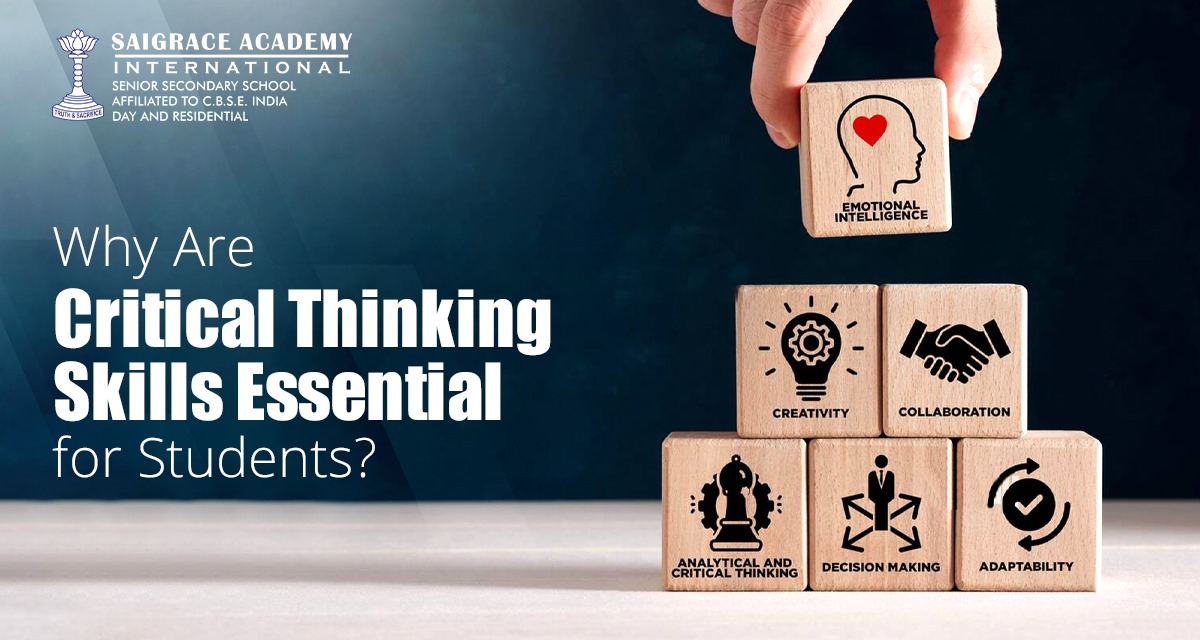
In today’s world, critical thinking skills are more than just an asset; they are a necessity. And as students prepare to face an ever-changing environment, it’s crucial for them to be able to analyze information, solve problems & make informed decisions.
Critical thinking goes beyond memorizing facts; it helps students understand the “why” behind what they learn, making them independent thinkers who are better equipped for real-world challenges.
Whether tackling complex math problems, interpreting historical events, or planning science experiments, students who develop strong critical thinking skills gain a deeper understanding of their subjects. This approach is not only useful in academics but also helps students in their daily lives, as they learn to question, analyze & draw conclusions based on evidence.
The Benefits of Critical Thinking
- Enhanced Problem-Solving Abilities
One of the key benefits of critical thinking is its impact on problem-solving. Students with critical thinking skills can break down problems into smaller parts, examine various perspectives & evaluate possible solutions. This structured approach allows them to tackle challenges more efficiently, whether they’re working on school assignments or dealing with everyday decisions.
- Improved Decision-Making
In an age of constant information overload, students need the ability to sift through data, understand it & use it to make informed choices. Critical thinking teaches them to assess the credibility of sources & distinguish between facts & opinions. This is particularly important in an age when media & social platforms often present biased or incomplete information.
- Increased Academic Success
Critical thinking is essential for academic success, as it encourages students to think independently & connect ideas across different subjects. Students who develop these skills tend to perform better in tasks that require analysis, synthesis & evaluation. Critical thinking skills make it easier to comprehend complex ideas & express their understanding effectively, which is valuable in both written assignments & verbal discussions.
- Boosted Creativity
While creativity & critical thinking may seem like opposites, they are closely linked. Critical thinking encourages students to think outside the box & explore various perspectives, which can lead to innovative ideas. When students learn to question assumptions & test different viewpoints, they develop a unique way of approaching problems thus enhancing their creative potential.
- Building Resilience & Independence
Critical thinking fosters resilience by encouraging students to learn from their mistakes & try alternative solutions rather than relying solely on set answers. Students with strong critical thinking skills tend to be more adaptable & independent because they know how to approach problems logically & aren’t afraid to question traditional methods.
- Strengthening Communication Skills
A strong critical thinker can present ideas clearly & logically, which enhances their communication skills. In group settings, these students are able to listen to others, ask meaningful questions & express their thoughts with confidence. This makes them more effective communicators & prepares them for collaborative work both in school & in their future careers.
Conclusion
The development of critical thinking skills gives students a solid foundation for both personal & academic growth. These skills help them navigate life’s challenges with greater confidence, flexibility & a sense of curiosity. By practicing critical thinking, students learn to become responsible citizens, capable of understanding complex issues, making well-informed decisions & contributing to society.
For parents & educators, fostering an environment that encourages critical thinking is crucial to students’ success. Schools that emphasize these skills, such as Saigrace Academy International, understand the importance of helping students become more than just good learners; they strive to develop responsible, independent thinkers who are prepared for the future.

